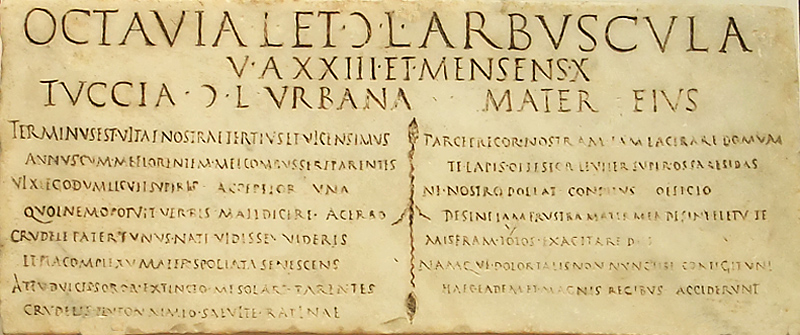
Octavia Arbuscula is memorialized in this epitaph apparently commissioned by her mother Tuccia Urbana (the formulaic feci/fecit is missing). Mother and daughter were both ex-slaves: Arbuscula was freed by Lucius Octavius and his wife (see freedperson names), while Urbana was freed by a woman named Tuccia (probably the gens name of Octavius' wife: see women's names), who may have brought Urbana with her as part of her marriage dowry. Arbuscula seems not to have been married, as otherwise her husband would have taken responsibility for her burial or been named in her epitaph. Dying as a freedwoman just before she reached 24 years of age, she was still below the minimum age of 30 for manumission set by Augustus (2BCE-4 CE). While a slave's freedom could be purchased at any time by anyone with the master's approval, a slave woman normally could be freed before 30 only if her master wished to marry her or if her master claimed her as his natural child. Arbuscula may have begun life as a home-born slave (verna) in the household of Lucius Octavius and his wife; as such she would have received privileged treatment, particularly if the master was her father. This tablet, found near the Via Salaria in Rome, is distinctive for the length of its inscription, its design and its metrical composition. These features would have made it costly, even though much of the verse is borrowed (see CIL 6.23551, CIL 6.5953 and glosses below). The poem is written wholly in the voice of Arbuscula, who, after identifying herself by age and character (lines 1-4), addresses not passers-by, a common device, but rather her surviving parents (a reference to her unnamed father in line 5) and sister, the god Pluto, and the stone itself. The epitaph is a hybrid, composed in dactylic hexameter (lines 1-7) and elegiac couplet (lines 8-15); it contains metrical and grammatical errors arising presumably from adapted borrowing and colloquial speech.

| Terminus est vitae nostrae tertius et vicensimus | Parce, precor, nostram iam lacerare domum. |
| annus cum me florentem mei combussere parentes. |
Te, lapis, optestor leviter super ossa residas, 10 |
| Vixi ego dum licuit superis acceptior una, | Ne nostro doleat conditus officio. |
| quoi nemo potuit verbis maledicere acerbo. | Desine iam frustra, mater mea, desine fletu te |
| Crudele pater funus nati vidisse videris 5 |
miseram totos exagitare dies. |
| et pia complexu mater spoliata senescens. | Namque dolor talis non nunc tibi contigit uni, |
| At tu, dulcis soror, exstincto me solare parentes. | haec eadem et magnis regibus acciderunt. 15 |
| Crudelis Pluton, nimio saevite rapinae. |
Click on the underlined words for translation aids and commentary, which will appear in a small window. Click on the icon link
![]() to the right of the line for related images.
to the right of the line for related images.